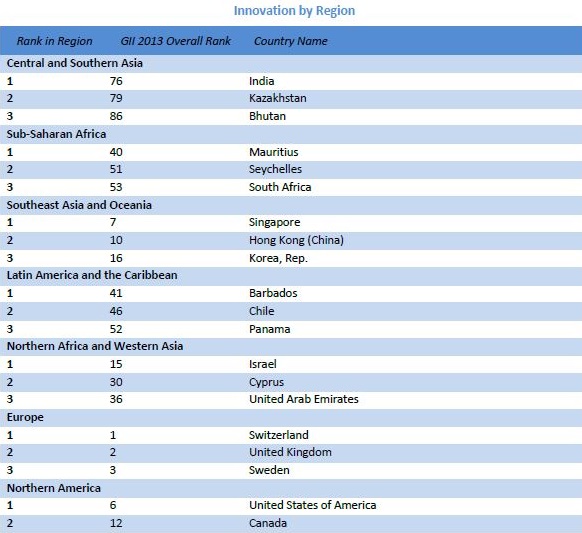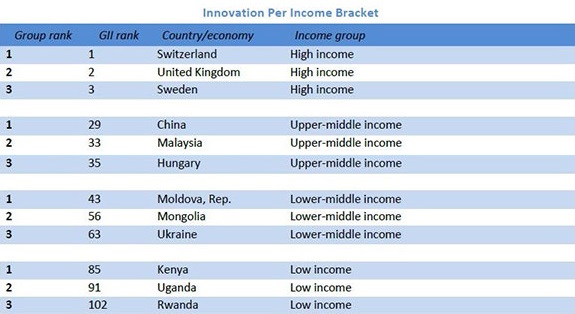Switzerland, the United Kingdom and Sweden topped this year's Global Innovation Index, while Sub-Saharan Africa posted significant regional improvement in the annual rankings published by Cornell University, INSEAD and the World Intellectual Property Organization.
Amid a newly documented slowdown in the growth of global research and development, the theme of the Global Innovation Index (GII) 2014 is "The Human Factor in Innovation," exploring the role of human capital in the innovation process and underlining the growing interest that firms and governments have shown in identifying and energizing creative individuals and teams.
For this year's GII launch, Australia's Minister for Industry Ian Macfarlane joined authors of the report and its partners in Sydney at a gathering of international business leaders (known as B20) which is part of Australia's preparations to host the annual Group of Twenty (G20) Leaders Summit on November 15-16, 2014.
"Launching the GII in the run-up to the G20 hosted by the Australian Government and as its first launch in the Asia-Pacific region reflects the uniqueness of the GII as tool for measuring and improving innovation performance. said Francis Gurry, Director General of the World Intellectual Property Organization (WIPO). He added "It recognizes the centrality of innovation for a job-rich, strong, sustainable and balanced growth path – as envisioned by the G20 leadership."
"I'm honored to launch the GII in Sydney today and am very proud to see Australia leading the way in trade and competition. Australia is an investment destination offering a highly skilled workforce. We understand that efforts to increase prosperity depend on innovation, creativity and a focus on new global markets, as well as a strong intellectual property system – a central part of the growth agenda being discussed by the G20," said Mr. Macfarlane.
The GII 2014 surveys 143 economies around the world, using 81 indicators–to gauge both their innovation capabilities and measurable results. Published annually since 2007, the GII is now a leading benchmarking tool for business executives, policy makers and others seeking insight into the state of innovation around the world. This year's study benefits from the experience of its Knowledge Partners: the Confederation of Indian Industry, du and Huawei, as well as of an Advisory Board of 14 international experts.
Top Rankings
For the GII 2014, Switzerland remains the leader for the fourth consecutive year. The United Kingdom moves up a rank to second place, followed by Sweden. A new entry into the top 10 this year is Luxembourg (9th).

These GII leaders have created well-linked innovation ecosystems, where investments in human capital combined with strong innovation infrastructures contribute to high levels of creativity. In particular, the top 25 countries in the GII consistently score high in most indicators and have strengths in areas such as innovation infrastructure, including information and communication technologies; business sophistication such as knowledge workers, innovation linkages, and knowledge absorption; and innovation outputs such as creative goods and services and online creativity.
The quality of innovation is assessed as well. In terms of innovation quality – as measured by university performance, the reach of scholarly articles and the international dimension of patent applications - the United States of America (USA) holds the top place within the high-income group, followed by Japan, Germany and Switzerland. Top-scoring middle-income economies are narrowing the gap on innovation quality with China in the lead, followed by Brazil and India.
Soumitra Dutta, Anne and Elmer Lindseth Dean, Samuel Curtis Johnson Graduate School of Management, Cornell University and co-author of the report, points out that "When reviewing the GII quality indicators, top performing middle-income economies are closing the gap with high-income economies. China significantly outperforms the average score of high-income economies across the combined quality indicators. To close the gap even further, middle-income economies must continue to invest in strengthening their innovation ecosystems and closely monitor the quality of their innovation indicators."
The GII 2014 confirms the persistence of global innovation divides. Among the top 10 and top 25, rankings have changed but the list of economies remains unaltered. A difficult-to-bridge divide exists where less-innovative economies have difficulty keeping up with the rate of progress of higher-ranking economies, even when making notable gains themselves. This can be partially explained by their difficulties to grow and retain the human resources necessary for sustained innovation, which is the focus of this year's report.
Bruno Lanvin, Executive Director for Global Indices at INSEAD, and co-author of the report, stresses that "As innovation becomes a global game, a growing number of emerging economies are confronted with complex issues whereby 'brain gain' can only be generated through a delicate balance between talents outflows (e.g. citizens seeking an education abroad) and inflows (whereby high performers return home to innovate and create local jobs, and diasporas contribute to national competitiveness). Around the world, we see encouraging signs that this is happening."
Various Groups Score Differently on Innovation
Viewing economies among their regional or income-group peers can illustrate important relative competitive advantages and help decision-makers glean important lessons for improved performance that are applicable on the ground.
How "Innovation Learners" Can Leverage Their Strengths
Economies that perform at least 10 percent higher than their peers for their level of gross domestic product are called "Innovation Learners."
The 12 high- and middle-income countries outperforming other countries in their respective income groups - in order of performance - are the Republic of Moldova, China, Mongolia, Viet Nam, India, Jordan, Armenia, Senegal, Malaysia, Thailand, Ukraine, and Georgia, and among low-income countries Kenya, Uganda, Mozambique, Rwanda, Malawi, Gambia, and Burkina Faso. These "innovation learners" demonstrate rising levels of innovation results because of improvements made to institutional frameworks, a skilled labor force with expanded tertiary education, better innovation infrastructures, a deeper integration with global credit investment and trade markets, and a sophisticated business community—even if progress on these dimensions is not uniform across their economies.
Sub-Saharan Africa: Becoming a Region of "Innovation Learners"
Among low-income countries displaying above par-performance, the Sub-Saharan African region now makes up nearly 50 percent of the so-called "innovation learner" economies. Sub-Saharan Africa now has more "innovation learner" economies than any other region, with five African economies joining that status in 2014: Burkina Faso, Gambia, Malawi, Mozambique, and Rwanda. These five economies demonstrate rising levels of innovation, particularly in the areas of human capital and research (collectively improving in their ranking on this pillar by 71 places) and market sophistication (collectively improving by 148 places).
Overall, Sub-Saharan Africa has seen the most significant improvement of all regions in the GII rankings, with Côte d'Ivoire showing the biggest improvement (20 places) and Mauritius taking the leading regional position (40th, an improvement of 13 places from 53rd in 2013). . Of the 33 African countries surveyed in the GII 2014, 17 saw an improvement in ranking.
The BRICS Economies
Among the BRICS (Brazil, Russia, India, China, and South Africa), four improved their positions (Brazil by 3 places to reach the 61st rank, the Russian Federation by 13 places to reach 49th, and China by 6 places to reach 29th, and South Africa by 5 places to reach 53rd). The progress of China and the Russian Federation in the rankings is among the most notable of all countries; China's ranking is now comparable to that of many high-income economies. India, however slips 10 places to 76th position this year.
"To become a country qualified as "innovation learner" in the GII, policy makers need to identify and focus on areas which help propel their performance on innovation inputs and outputs relative to their peers and to excel beyond what is expected from them considering their level of development," said Chandrajit Banerjee, Director General of Confederation of Indian Industry (CII), noting " The chapter on India in the GII 2014 analyses one such important parameter like human capital, and showcases how policies for nurturing human capital affect the performance of an innovation learner like India."
du CEO Osman Sultan, commented: "Innovation and sustainable growth go hand in hand. In a boundary-less world such as ours, connected innovation is increasingly gaining prominence. This is being fuelled by a more collaborative approach, challenging conventional methodologies and freeing-up efficiencies thereby benefitting everybody. The UAE leadership's vision is a great example of this as it fosters a connected innovation ecosystem from the ground up. As a telecommunications service provider in the UAE, we are uniquely positioned in strengthening the 'Human Factor' in this evolving innovation ecosystem, by facilitating the global exchange of intellectual capital and collaborative empowerment."
"These findings underline the importance of human capital in fostering innovation," said Ken Hu, CEO of Huawei. "We believe that the 2014 GII report will act as a catalyst for countries to learn from one another and jointly create an open and effective innovation environment. At Huawei, we are committed to innovation by investing in our most important resource: our people."
The Human Factor: The Essential Spark to Innovation
This year's report, both through its sub-indicators and through the chapters provided by the UNESCO Institute for Statistics, the OECD and reports on India, Russia, the United Arab Emirates, South Africa and Morocco highlights how the human factor of innovation partly explains which innovation champions remain at the top, and why some of the large emerging economies offer divergent innovation performances.
In terms of education as a subset of human capital formation the top performers within the high income group are the Republic of Korea, Finland and the UK. China, Argentina and Hungary take the top positions among the middle-income countries. All of these countries have made visible efforts to maintain or enhance the quality of their human resources through education and life-long learning.
The GII shows that better educated citizens are more successful in higher-income economies in leveraging the favorable contexts for driving innovation. As countries move up the scale of innovation sophistication, the quality of its talents in science, engineering, but also in business and management for example become even more critical.
Global R&D Spending: Strong Post-Crisis Recovery; Growth Slowing Since
A fall in the growth of public R&D support coupled with the continued hesitancy of company R&D expenditures seems to be leading to slower overall growth of total R&D expenditures worldwide; this is the case especially in high-income countries. In many advanced countries, fiscal consolidation also seems to have negatively affected public spending on education since 2010.
Second, although governments have effectively included a significant number of future innovation-related growth projects in stimulus packages in 2009, support for such efforts seems to have lost momentum in some countries. To be sure, the majority of countries for which data are available continue to show positive R&D expenditure growth in 2013 and 2014. Yet strong R&D spending growth in 2013 and 2014 is expected to take place mostly in Asia, in particular in China, the Republic of Korea, and India.



















































